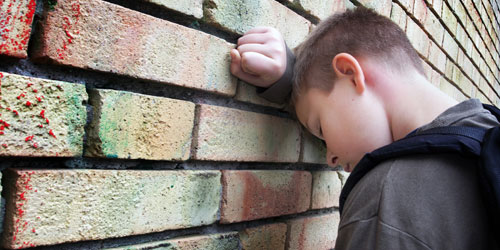
The tragic suicides of bullying victims in the last couple of years have been worst-case scenarios of what happens when someone reaches rock bottom. But for those hanging onto hope that it does, indeed, get better, it can still be a living hell.
"The majority of the youth who utilize our services are bullied on a daily basis and have serious emotional disturbance," says Laura Hughes, executive director of the Ruth Ellis Center, a shelter for homeless youth in Highland Park. "Their experience includes physical and verbal attacks. And this says nothing about the youth who come in with black eyes and have been beaten with bats and pushed into lockers."
It happens in schools and via the Internet, where cyberbullying is now rampant. Bullying, unfortunately, almost seems like a part of life – particularly for LGBT teens. Gregory B. Gruley, a therapist who practices out of his own office in Royal Oak, sees many young people coping with being bullied. So many of them, he says, won't even talk about it.
"More than anything it's trying to crack through the kid to even admit that it's even happening," Gruley says. "It's so embarrassing in the first place, and often they don't know who they can trust. Am I going to tell their parents and are their parents going to tell the school, and is the school going to make it worse? They don't know who to trust because the people that they think they can trust are often the ones turning on them."
It's just one of many effects that can mentally impair someone for the rest of their life, making trust a major issue in future relationships.
"It teaches people the wrong way to interact with other people and it can be maladaptive and any relationship they have can be affected by it – and usually for the negative," he says.
Kids are affected negatively in other ways, too: nightmares deprive them of sleep, grades suffer and there's a serious feeling of hopelessness and damaged self-esteem. Thoughts of suicide then take hold.
"They start to believe something that's not true about themselves," Gruley says of why bullied kids contemplate suicide. "They don't know how to handle it and they don't know how to combat those feelings. They feel like there's no other answer and they don't want to deal with the extreme negative feelings they get every day – maybe they're feeling nauseated, maybe they're getting beaten up. But it's unfortunate because, obviously, it's permanent."
Johnny Jenkins says it's a major concern for the kids at Affirmations, where he's the director of programs. "What's of most concern to us is dealing with issues of isolation and depression, which leads to the root of the current suicide rate among LGBTQ-identified youth. That's something that concerns us greatly and is part of our focus with our youth program: to make sure we provide a safe environment for youth to come and have those conversations and find support."
The center's programs, Jenkins says, help alleviate them of stress and build self-esteem, curbing not just mental health issues, like anxiety, but physical ones as well.
"When you have strong emotions that don't have an outlet, they'll find another way out – very often it's through additional psychological issues or even psychosomatic problems," Gruley says. "I couldn't tell you the number of times that I worried myself to vomit, so bullying can have digestive problems. Lack of sleep can certainly impact someone's ability to function and their overall health. If you're constantly worried about something, your immune system will be compromised."
Bullied teens are also at a higher risk of obesity and engaging in unprotected sex, according to Jenkins. "It devalues you as a human being," he says, "and once you're feeling devalued it lowers your self-esteem and it makes you more vulnerable to engage in risky sexual behavior. That makes you more susceptible to HIV and other STDS."
Hughes has seen every kind of symptom from the bullied youth she oversees at the Ruth Ellis Center.
"Some of the health issues that we have seen are a myriad of physical, psychological and behavioral symptoms and effects on personality," she says. "Through our services we are able to address stress, anxiety, sleeplessness, fatigue, shattered self-confidence and self-esteem, thoughts of suicide, poor concentration and post-traumatic stress disorder."
Homeless and runaway teens, Hughes adds, have a disadvantage: no sense of security.
"Their lack of safety net only exacerbates the effects of bullying on their lives," she says. "The center is fortunate to be in a place that we provide this support and intervene on their behalf and provide them with opportunities that allow them to craft legislation and advocacy around bullying within our communities."
Even if we can't stop the bullies, we can stop kids from falling victim to the effects of the bullying. Gruley suggests any kind of support, from a close friend to a teacher or therapist, where trust is established. That includes kids sticking up for other kids, he says, "and not allowing the bullying to happen."
"Just being able to talk about what's going on and getting out all those feelings of fear and anxiety is beneficial. When you hold it in, you get all those other symptoms that come up with it."
His other suggestion? Befriend a bully.
"So frequently bullying happens for a variety of reasons," Gruley says, "but one of the most common ones is the bullies have something about themselves that they're embarrassed about and they don't want other people to notice so they shift the focus to another person who is the victim. Shine the light on that person for whatever they're trying to hide, and I think the bullying will naturally go away because it will no longer serve a purpose."











